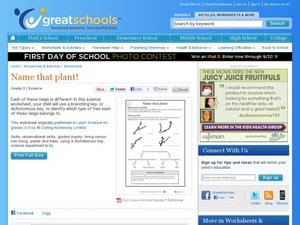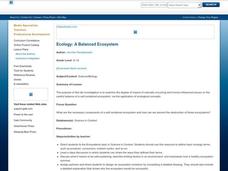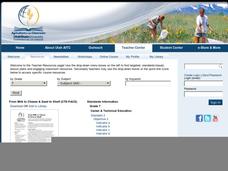Desert Museum
Daisy Ecology
Here's a fine lesson plan that combines poetry with life sciences. Learners carefully listen to a poem that's all about a food chain. As the poem is read, learners name the producer, the herbivore, the carnivore, and the omnivore. Lots...
University of California
Energy and Biomass Pyramids
Young scientists play tag as they act out the food pyramid in the ocean ecosystem. Energy circles pass from the smaller prey to the predators and at the end of the activity, a data chart and analysis questions allow pupils to apply their...
Curated OER
Food Chains
Learners take a look at the relationship between organisms in food chains, food webs, and energy pyramids. After an opening demonstration by the teacher, pupils are split up into groups. Each one is assigned an environment such as:...
Curated OER
Name that plant!
What is a dichotomous key? When your kids ask, hand them a learning exercise like this one, to explain it. They use the key to identify four different trees, based on the budding twigs they've produced. Tip: Have learners extend this...
Curated OER
Keys and Webs
Students explore and classify organisms found in a Rocky Mountain Ecosystem. Through discussions, students examine the effects upon an ecosystem if a component was removed or a new component was added. As a class, they survey reasons...
Curated OER
Everybody Needs a Little Sunshine
Three activities introduce upper elementary ecologists to photosynthesis and food webs. In the first, an experiment is set up to determine how plants respond to different types of light. In the second, they connect organism cards with...
Curated OER
Ecology
Pupils gain an understanding of necessary components required within a healthy, sustainable environment and ways human actions can impact that balance while discovering how to recognize and analyze explanations and models used in...
Curated OER
Food Web Mobile
Students explain the main concepts of food webs and food chains. They
describe the role of animals, plants, and other organisms in cycling energy and matter through a food web by creating mobiles. Lesson contains adaptations for all levels.
Curated OER
The Food Chain Game - A Lesson in Ecosystems
Students are divided into three groups, herbivores, omnivores, and carnivores which receive a certain number of lives. Once in their ecosystem (outside or the gym), the carnivores chase and eat either the herbivores or omnivores, the...
Curated OER
Fun With Food Chains
Students explore our ecosystem by researching animal eating habits. For this food chain lesson, students identify the links between predator and prey and the energy that passes between organisms based on what their diet consists of....
Aquarium of the Pacific
Ecosystem Comparison
Fifth graders examine plants and animals in two ecosystems and compare them. In this ecosystem survival lesson, 5th graders compare and contrast a coral reef and kelp forest ecosystem. Students investigate the abiotic and biotic factors...
Curated OER
Cycles of Life in an Urban Habitat: Changes in Biodiversity
Second graders compare and contrast animate and inanimate objects. In this environmental science lesson, 2nd graders create simple food webs. They observe their environment and create a collage about it.
Curated OER
Saved by a Shark
Students explore the marine ecosystem and the importance of sharks. In this shark lesson, students look at photos of the Flower Garden Banks National Marine Sanctuary and discuss the animals that live there. They discuss which animals...
Curated OER
Tootsie Roll, Tootsie Roll, Who Art Thou?
Students discuss gender role stereotyping and males and females in non-traditional work roles. They debate and discuss opinions as a group, and then as a class, concerning "men only" and "women only" jobs
Curated OER
From Milk to Cheese & Seed to Shelf
Learn about food production by making cheese, seeing how a seed gets to a shelf, and discussing food safety. Budding agriculturalists complete several activities and learn about food production, biotechnology, food preservation,...
Curated OER
High-Tech Food: Science in Your Shopping Cart
Kids are given a lot to think about, as they delve into the world of high-tech foods. They discuss GMOs, biotechnology, food enhancements and domestication. They view videos, engage in class discussions, complete worksheets, and learn...
Curated OER
Source Search: Agricultural Products
Farmers just farm, right? Find out how important agricultural products are to our modern society. Learners will explore the foods, textiles, and fuels made from industrial farm goods. They'll also explore the idea of choosing an...
Curated OER
What's on My Plate?
Kids work together in groups to discuss and understand the differences between a typical diet and a healthy one. They use the My Plate recommendations to compare what they eat with what they should be eating according to the MyPlate...
Humanities Texas
A President's Vision: Lyndon Baines Johnson
Learners take a closer look at the presidency of Lyndon B. Johnson, including the Great Society and the passage of the Voting Rights Act, through image analysis and primary source worksheets.
Japan Society
The Bubble Economy and the Lost Decade
Explore Japanese society and national identity. Class members share ideas about the Japanese economy and then investigate a series of resources, including an article, a film, a lecture, and a poem, to learn about Japan's Bubble Economy...
Curated OER
Clothes on the Grow
Can you grow clothes? Sure, wool, cotton, and Angora are all natural resources used to make textile products. Learners investigate the differences between synthetic and natural fibers, then consider textile processing careers. They watch...
Curated OER
Finding My Pathway
Eighth graders engage in a activity that is concerned with the acquiring of skills necessary to make informed career choices. They examine the type of language that should be acquired for communication in the workplace. They also have...
Curated OER
"I Will Do It!"
Second graders identify effective work habits. They choose 2 work habits that they personally want to practice for a week. Students are asked: "What kinds of work or study habits are most helpful to the individual person to use in many...
Curated OER
What's In Your Bag?
Guess what is in the bag! Use this instructional activity at the beginning of the year to discuss appropriate items for 4th grade students to have in school. Each group develops a list of appropriate items as well as inappropriate items,...

























